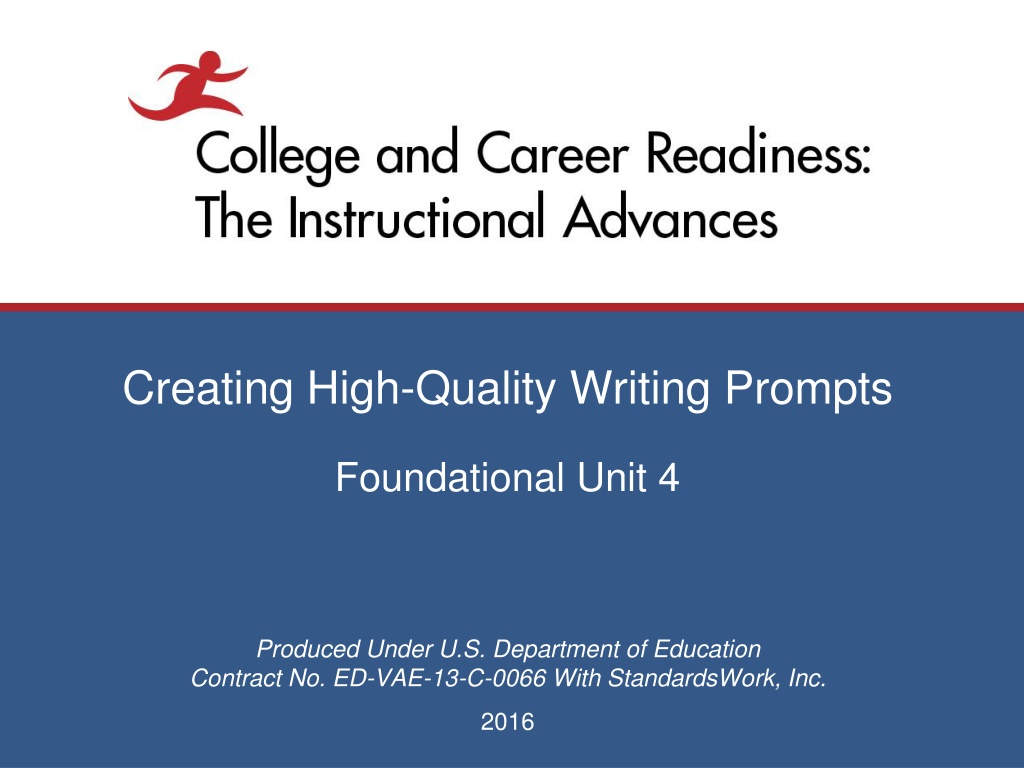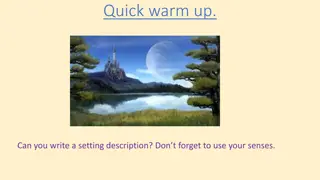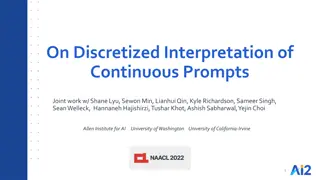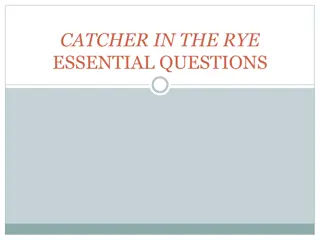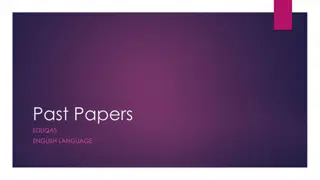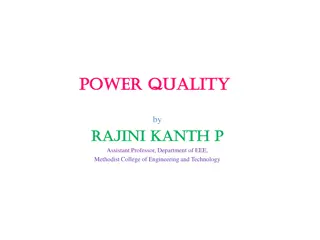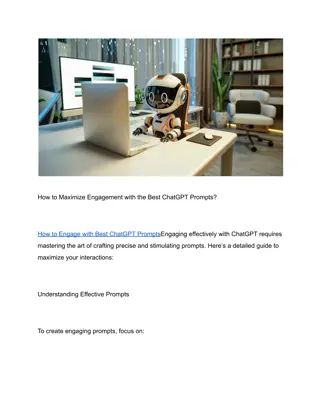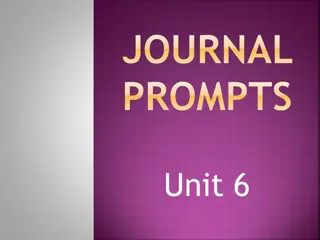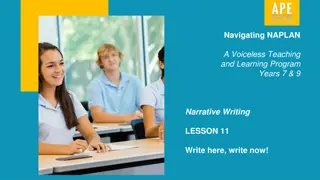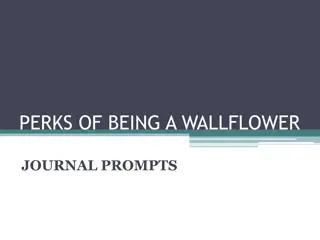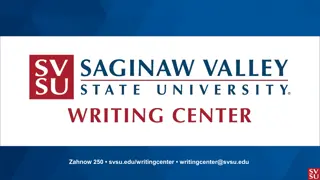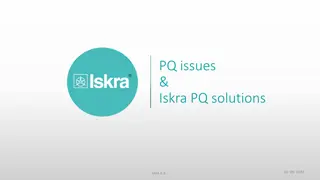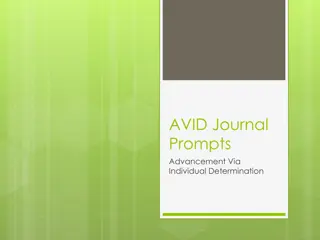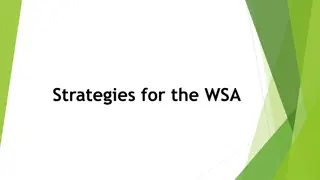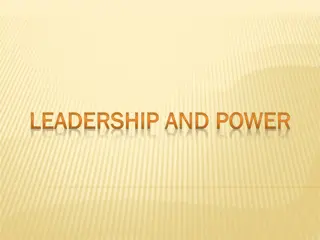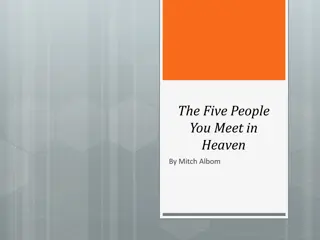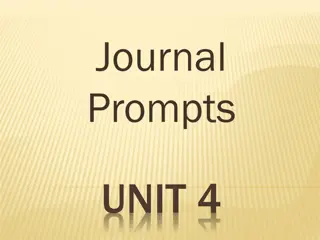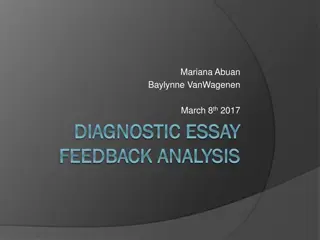Unveiling the Power of Quality Writing Prompts in Education
Delve into the significance of well-crafted writing prompts as tools for enhancing learning, reading comprehension, and knowledge-building in the educational realm. Explore the key advances influenced by CCR standards and understand the rationale and implications of utilizing high-quality writing prompts effectively. Engage in hands-on practice to identify exemplary writing prompts that foster student growth and understanding.
Download Presentation

Please find below an Image/Link to download the presentation.
The content on the website is provided AS IS for your information and personal use only. It may not be sold, licensed, or shared on other websites without obtaining consent from the author. Download presentation by click this link. If you encounter any issues during the download, it is possible that the publisher has removed the file from their server.
E N D
Presentation Transcript
Creating High-Quality Writing Prompts Foundational Unit 4 Produced Under U.S. Department of Education Contract No. ED-VAE-13-C-0066 With StandardsWork, Inc. 2016
Three Key Advances Prompted by the CCR Standards 1. Text Complexity: Regular Practice With Complex Text (and Its Academic Language) 2. Evidence: Reading and Writing Grounded in Evidence From Text 3. Building Knowledge: Building Knowledge Through Content-Rich Nonfiction 2
Key Advances Build Toward College and Career Readiness 3
Unit 4 Objectives Creating High-Quality Writing Prompts Show how valuable a well-crafted writing prompt can be as a summative learning activity not just for learning to write but also for reading comprehension and building knowledge. Learn how to identify and create strong writing prompts. 4
Rationale for Building Knowledge From Texts Relevance and Importance Based on the Research Prior knowledge is a strong predictor of students ability to comprehend complex texts. To cultivate their knowledge, students must read and write regularly about content-rich, complex texts. (Hampton and Kintsch) Writing about what they read improves students comprehension of the text (and their writing skills). (Graham and Hebert) The reading deficit is integrally bound to a knowledge deficit. (Hirsch) 5
Implications of Building Knowledge on Instruction Provide coherent selections of content-rich, strategically sequenced texts so students can build knowledge about a topic. Always demand evidence in student writing. Provide well-crafted writing prompts as a summative learning activity, not only to improve writing, but also to strengthen reading comprehension. Ask students to regularly conduct short, focused research projects and defend their point of view to create a useful and lasting knowledge base. 6
Hands-On Practice Now let s do some work identifying high-quality writing prompts . . . 7
Materials (Part One) Directions for Participants Worksheet: Writing Prompts for The Words We Live By: Your Annotated Guide to the Constitution Resource: CCR Anchor Standards Resource: Excerpt from The Words We Live By: Your Annotated Guide to the Constitution 8
Directions (Part One) 1. Get out your copies of The Words We Live By, CCR Anchor Standards, and the worksheet containing two writing prompts for The Words We Live By. 2. Work with a partner to determine which prompt is aligned to the CCR Standards and which prompt is not. For each of the two prompts you are examining, ask the questions on the following slide to determine which prompt is stronger. 9
Guiding Questions Is the question worth asking? Does it provide students with an opportunity to explore what they have learned from the text? Does it ask students to include evidence from the text in their response? Does the prompt use the language of the CCR Standards where appropriate? Is the prompt reasonable for the time and energy allotted? 10
Directions (Continued) 3. After you have decided which prompt is the best, use the CCR Anchor Standards to determine which reading, writing, and language standards are embodied in the aligned writing prompt. 4. Share your results with the group at your table. Work Session 15 minutes 11
Discussion Questions What is the value of the text-dependent prompt compared with the other prompt? What CCR reading, writing, and language standards do you think students would address when working on responses to this prompt? What changes in current practice might this type of writing require? 12
Hands-On Practice Now let s do some work generating a high-quality writing prompt . . . 13
Materials (Part Two) Directions for Participants Resource: CCR Anchor Standards Resource: Eleanor Roosevelt s Speech to the Members of the American Civil Liberties Union Resource: Identifying Questions Worth Answering Answer Key for Eleanor Roosevelt s Speech to the Members of the American Civil Liberties Union 14
Directions (Part Two) 1. Read the Roosevelt text and the high-quality, text-dependent questions written for it. 2. Use the essential understanding or central idea identified to begin framing the prompt. A great prompt should get students to their own grasp of that essential understanding. 3. Discuss possible prompts with your partner(s). 4. Examine the CCR Anchor Standards for reading and writing to determine which standards you want to have students focus on in fulfilling this prompt. 15
Directions (Continued) 5. Agree on and write a prompt. Discuss whether it will produce writing for building an argument (CCR Writing Standard 1) or explanatory or informative writing (CCR Writing Standard 2) and label it. 6. Discuss the prompts you and your colleagues developed, and determine which of them best meets the criteria on the following slide. Work Session 45 minutes 16
Criteria for High-Quality Writing Prompts Require students to gather, organize, and present evidence from what they read. Expect students to return to the text. Use the language of the CCR Standards where appropriate. Give writers an opportunity to explore what they learned from the text. Require an exploration of the most essential ideas from the text. Are reasonable in terms of the time and energy allotted to students to complete the task. 17
Reflections Are any volunteers willing to share their writing prompt? What makes a good prompt? What changes in current practice might this type of writing require? 15 minutes 18
Next Steps How has participating in this activity changed your thinking about the CCR Standards? How will you use the information and understanding you have acquired to improve your teaching practice and student learning? What additional training and tools would strengthen your ability to do so? 19
